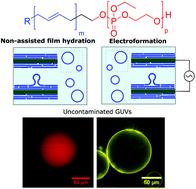Giant polymersomes from non-assisted film hydration of phosphate-based block copolymers†
Abstract
The self-assembly of amphiphilic block copolymers is a fast way to prepare chemically versatile and stable “protocells” that can act as a reactor or a confinement. However, controlling their self-assembly into giant unilamellar vesicles (GUVs) with diameters of several micrometers is challenging. Electroformation has been used to generate GUVs from amphiphilic block copolymers, which can be studied by light microscopy and resemble cell-like entities. However, a mild film hydration protocol for GUV preparation would be desirable in order to prepare libraries of protocells for further applications. Here, we present the self-assembly of novel amphiphilic polybutadiene-block-polyphosphoester block copolymers into GUVs by simple film hydration. These amphiphiles are synthetic analogs of phospholipids and possess the hydrophilic poly(ethylene ethyl phosphate) (PEEP) block. The GUVs (with diameters of ca. 10–40 μm) were formed in high yields by simple non-assisted film hydration requiring no external forces and with no need of the commonly applied electroformation. PEEP-based block copolymers with a lamellar bulk morphology produced GUVs in high yields and outperformed commonly used block copolymers (e.g. with poly(ethylene oxide) as a hydrophilic segment). We quantified their respective yield (number of GUVs formed) and diameters and monitored their stability over time. In addition, we proved their encapsulation capacity and permeability to hydrophobic and hydrophilic fluorescent cargo. Due to their high performance, these phosphate-based amphiphilic block copolymers are promising candidates for the generation of protocells and self-assembled microreactors.



 Please wait while we load your content...
Please wait while we load your content...